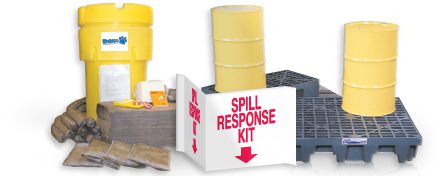
In 2015 Congress amended the FCPIA Act of 1990. This change has required the EPA and OSHA to increase their civil monetary penalties. Some of these penalties have increased to over $51,000 per violation. Businesses cannot afford to put off their hazardous waste compliance any longer without risking the consequences.
7 Requirements Auditors Look For
1. Generator Category
There are both Federal and State level requirements pertaining to the amount of hazardous waste a generator produces. It is important to be knowledgeable with both levels of regulation. This will assure your company is in compliance and avoids large fines. The three waste generator categories are:
- Conditionally exempt small quantity generators (CESQG)
- Small quantity generators (SQG)
- Large quantity generators (LQG)
2. Unidentified Wastes
The best thing you can do to make sure you are in compliance is to read the labels. Container labels give clues as to what may be hazardous and require specific handling, or removal. If a label says danger, warning, poison, flammable, or toxic then it’s signifying that the product contains a hazardous chemical. A good rule of thumb is if a waste material has a Safety Data Sheet (SDS) it is probably a hazardous waste.
3. Improper Storage
LQG management standa rds state that a chemical that doesn’t have proper labeling is a hazard. You must always keep proper labels on all chemical materials, as well as keeping track of expiration dates. Once a chemical reaches its expiration date it becomes a hazardous waste and must be disposed following EPA regulations. Hazardous waste must be stored in proper containment, or a collection system that is closed, not bulging, leaking, rusting, or broken. The collection system must be compatible with the waste it will be storing to maintain safety.
rds state that a chemical that doesn’t have proper labeling is a hazard. You must always keep proper labels on all chemical materials, as well as keeping track of expiration dates. Once a chemical reaches its expiration date it becomes a hazardous waste and must be disposed following EPA regulations. Hazardous waste must be stored in proper containment, or a collection system that is closed, not bulging, leaking, rusting, or broken. The collection system must be compatible with the waste it will be storing to maintain safety.
4. Lacking Training Requirements
Anyone that handles or is responsible for hazardous waste, even a person signing a hazardous waste manifest, must meet specific training requirements to legally perform certain duties. Training ensures that hazardous wastes are appropriately identified and handled safely to protect human health and the environment according to 49 CFR §262.40. All facilities must use a licensed hazardous waste transporter, and Transport Storage and Disposal Facility (TSDF).
5. Improper Record Retention
When disposing of hazardous waste there is a paper trail that should be maintained carefully. Many companies that produce hazardous waste are required to keep a logbook that will contain entries stating the name of the person who inspected the storage area, as well as the date and time of the inspection. Companies must also maintain records of shipping documents. This includes, hazardous waste manifests, bill of ladings (BOL), certificates of recycling and any other documentation regarding the waste removal and transportation for a minimum of three years.
6. Safety Equipment missing or not meeting requirements
According to LQG management standards, a company is required to have certain safety equipment, which will be listed in the contingency plan. Some of the equipment includes:
- Alarms and Emergency Communication Systems

- Fire Extinguishers
- Spill Control Equipment
- Decontamination Equipment
7. Contingency plan
SQGs and LQGs are required to have a contingency plan, but the detail varies depending on the generator category. According to 40 CFR §262.34(d)(4), SQGs are required to have a basic plan and LQGs are required to have a full plan. A contingency plan is a planning tool that minimizes hazards to human health or the environment. Not having a contingency plan will result in an extensive fine that many businesses cannot overcome. The plan must include:
- Detailed actions to be taken in case of an emergency
- Who the emergency coordinators are, including their contact information.
- List of all emergency equipment
- Fire evacuation plan
Does all that goes into the proper handling of hazardous waste leave you feeling overwhelmed? Give our team at MLI Environmental a call or email us today. Let us take the burden of worrying about hazardous waste compliance and EPA audits off your shoulders.

